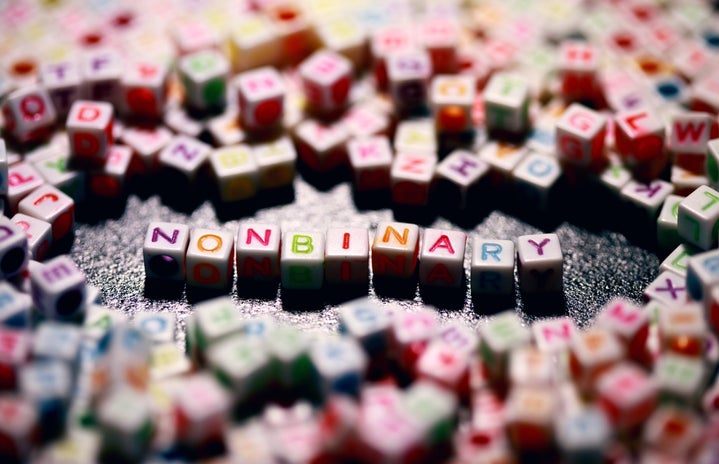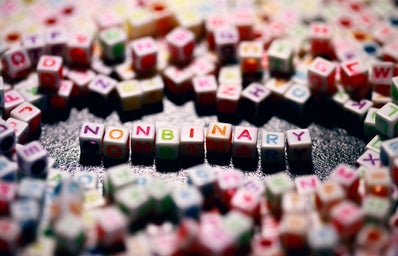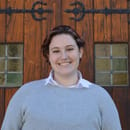I have known that I have been different since I was a child, when I did not understand that what you did was in the world was restricted by your gender. I was raised in a household that subconsciously followed gender stereotypes. When I wanted to wear boys’ clothes or do things that were not dolls my parents did not bat an eye since I have an older brother, but this changed when I entered the American schooling system. I found that I was being put into a box and there was nothing that I could do to change it, and rather than being bullied for being different I found myself conforming to what society wanted of me. I was still bullied of course but this was not because of the books I read or how I dressed.
I found that I repressed these feelings for the longest time since I never really had a reason to process them until the pandemic struck. When we had to isolate ourselves from society, I did what many other queer teenagers did, question their gender. I found myself turning to Google and the internet rather than the people that I was with. My search history was filled with questions like, why don’t I feel like a girl? I am not a girl, but I am also not a boy? What does it mean to be Nonbinary? Am I nonbinary? After weeks of confusion and tears I figured out that I was neither a girl nor a boy, but I was me, and that was enough. I tried different pronouns and settled on they/them/theirs quite quickly, but there was one piece of the puzzle that was missing… my name. There are people that stick with their name given to them at birth, but I found no positive connection to my birth name. When I thought of this name I was flooded with sour memories and a longing to be someone else, so I began the hunt for a new name.
It was in this moment I understood why many parents struggle to name a child. I found myself looking at those baby names websites looking for a name that felt like me, but there was nothing there. I was scowering through family names and other people I looked up to, but I felt that none of these matched who I was. Late one night I realized that I did not want a name that had a legacy or a meaning for me to try and live up to, I wanted a name that had no strings attached no expectations. I found something to look for and after a lot of experimenting, I found Nez. Nez stems from a nickname my close friends gave me in high school, and it was the closest thing I had that felt like me. I found myself standing in front of my mirror way to eat at night introducing myself with these different names. When I introduced myself as Nez, it just clicked. A smile adorned my face brighter than any smile I had seen before, this was me.
I had found my preferred name at the worst time possible, roughly half way through my first semester here at Loyola. I was scared to tell my teachers that I had a new name and pronouns this late into the year, and that they would simply not understand, so I hid. I cowered behind a name that did not belong to me, and every time I was called on in class it was like a stab wound to the heart, I knew this had to change but I did not know what to do. I had looked into it and at the time there was no information on how to input your preferred name for the system at Loyola. The dance began in the spring, coming out to those who knew me as my dead name and introducing myself as Nez to the new people I met. I was floating between these two worlds and not being out to my parents did not necessarily help. Loyola came out with the preferred name form and I was ecstatic, and since then everything has been perfect. There was no fear or embarrassment on the first day of classes or when I opened my emails.
This experience was seen through rose-colored glasses because no institution is perfect, even Loyola. Professors and other students excelled in using preferred names and understanding different identities, I found that different university offices struggled with this more. Many forms that are being sent out by Loyola ask for your gender and many only give two options. I find myself just staring because I do not fit into either of these boxes, it made me feel alone when I was surrounded by my peers who had no issues answering this question.
Another issue is the lack of gender-neutral bathrooms around campus. There are specific buildings like Donnelley and the humanities building where there is only one stall so it can be a gender-free bathroom, but this is not the case for all. When I am in the student center, I find that I must put myself into a role that I am not comfortable in, and in a way it feels humiliating. I find myself spending so much time reinforcing that I am not a woman and that I do not use she/her pronouns, but all this progress goes flying out the window when I must use the women’s bathroom here on campus.
Finally, my most recent struggle is with the health center. I visited the health center and they called me by my deadname, I told them my preferred name and they said that it would be put on my file and that it would be used. I had to return, and it was like nothing had happened, I had tried to check in with the name and I was told that there was no appointment for this person when I had one, it was just under my deadname.
I must say that despite all the work that needs to be done at Loyola, the community is strides ahead of other communities. Loyola is filled with people that care and support this growth and value it. I found comfort that Loyola not only welcomes the LGBTQ community but also celebrates it. It makes a person not feel so alone. There is work to be done but we cannot forget all that has already changed.


